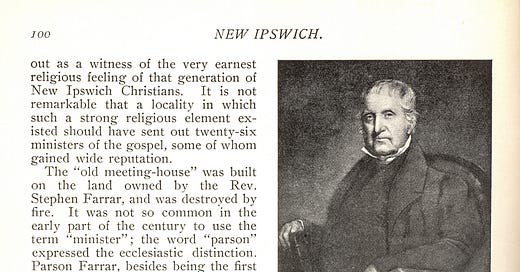Recap of Page 99
March 1900 - Page 100
…out as a witness of the very earnest religious feeling of that generation of New Ipswich Christians. It is not remarkable that a locality in which such a strong religious element existed should have sent out twenty-six ministers of the gospel, some of whom gained wide reputation.
The "old meeting-house" was built on the land owned by the Rev. Stephen Farrar, and was destroyed by fire. It was not so common in the early part of the century to use the term "minister"; the word "parson" expressed the ecclesiastic distinction. Parson Farrar, besides being the first incumbent of the Congregational church, enjoyed the happy distinction -for it was a distinction in those days of receiving his salary in money. In the musty town records one may read that he was paid annually "40 pounds sterling, together with 40 cords of fire wood," which is suggestive of the very simple needs of that generation.
Notwithstanding the quiet simplicity of his way of living, Parson Farrar held as strong an influence over his parishioners as that wielded by any prelate in the pomp of ecclesiastic authority and office. Two of his church members were discussing theology one day. "What are your views on the doctrine of infant damnation?" inquired one. "I believe the same as Parson Farrar," was the reply. "Well, what does he believe?" the "I don't know," was the rejoinder. "You ask him about it."
Judge Timothy Farrar, brother of Parson Farrar, was also a citizen who added lustre to the fame of his native town. Judge Farrar was a partner of Daniel Webster in the city of Portsmouth, and was for forty years judge in the supreme and common pleas courts of New Hampshire. When the Constitution of the United States, which by the terms of the instrument was not to go into effect until nine of the original thirteen states should ratify it, was adopted by the last of the nine states, Rhode Island, the governor of New York sent out a messenger to bear the tidings. The governor's envoy reached New Ipswich on Sunday, June 22, 1790. One can imagine the flutter of excitement that ran through the congregation that Sabbath morning, as the elders and deacons and righteous folk sat decorously worshipping and doing their best to follow the parson's discourse in spite of the hum of the bees and the scent of the clover that came in through the open windows.
(continued tomorrow)
On this day - January 11, 1898
William Jurian Kaula diary - no entry
On this day - January 11, 1909
James Roger diary entry
11th (Monday)
Fresh wind, roads muddy. David choring round in forenoon. Went to Greenville in afternoon for kerosene and mouse traps. Elroy Jowders called today about Town Hall for town meeting night. Joe Silver claims same night. Got letter from Hamish, May, Berkley, Mrs. Amee & Dr. Hildreth also papers and esparto from Scotland.




I was curious about Hamish and why letters seemed to be their (James & Hamish) main source of communication. My research revealed that there was a Hamish Roger from Gloversville NY (10 miles northeast of here) who made trips to New Ipswich to visit his brother. He owned a company that dealt with fine cloth.